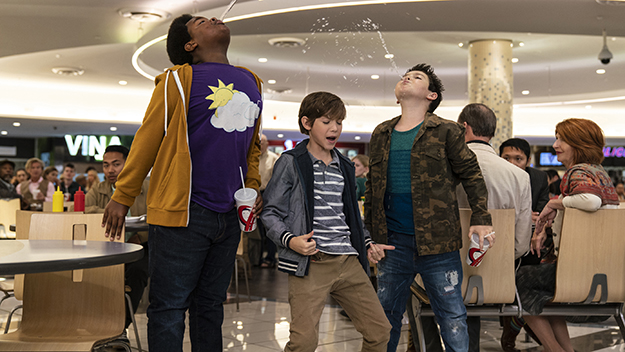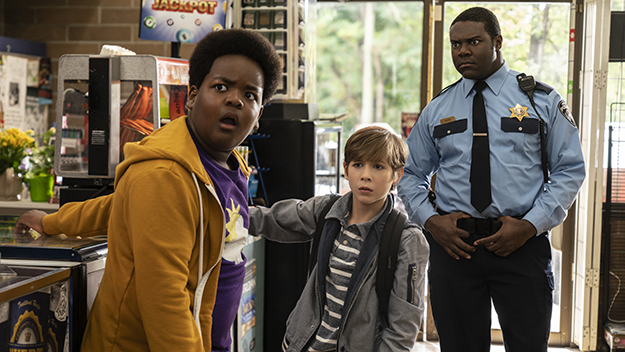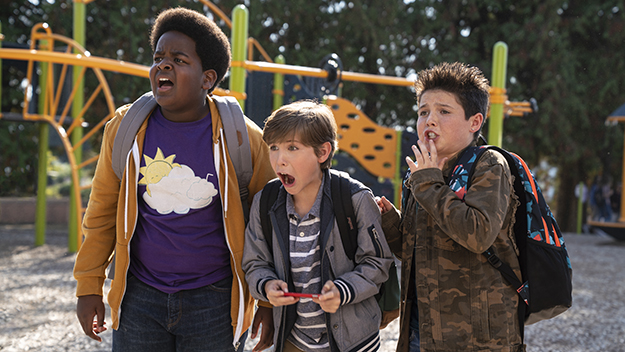Deep Focus: Good Boys

Images from Good Boys (Gene Stupnitsky, 2019)
Profanity and banality make for a joy-killing combination in Gene Stupnitsky’s sixth-grade, fourth-rate farce Good Boys. Its low-down high concept—“suburban tweens talk dirty”—wears out to the point that curse words function as white noise. Even the twist built into this concept—the kids don’t understand what they’re saying—rarely generates witty or felicitous lines, though I did like when the hero defined “nymphomaniac” as a woman who makes love on land and sea.
There’s no tread left on Stupnitsky and Lee Eisenberg’s script by the time the movie sputters to the finish line. The characterization is either stock or skimpy, so the payoff to the film’s motivating event—an invitation to a “kissing party” for 12-year-old romantic Max (Jacob Tremblay), the first chance he’ll get to make time with his middle-school crush—barely registers even as an anti-climax. Max’s first kiss carries less visual and verbal impact than the vintage commercial for orange soda that told an entire love story in one minute, with back-lit, soft-focus images and a song proclaiming, “Feels so good, you want your first Crush to last.” In Good Boys, the aftermath takes a gentle satiric poke at the fleeting nature of puppy love; it also testifies to the screenwriting’s wispiness and the director’s over-calculation.
Max, aspiring singer Thor (Brady Noon), and incorrigibly honest Lucas (Keith L. Williams) call themselves “The Bean Bag Boys,” not “Good Boys.” In the movie’s lengthy mid-section, figuring out the logistics of planting a kiss panics Max, who enlists his fellow Bean Baggers to find some kind of idiot’s guide to osculation. They end up commandeering Max’s dad’s drone and using it to spy on their constantly dating high school neighbor Hannah (Molly Gordon). Unfortunately, while they wrestle over the controls, their eye-in-the-sky plummets into the girl’s backyard. The film becomes a caper parody as the Bean Baggers battle for possession of the UAV with Hannah and her bestie, Lily (Midori Francis), who demand a gummy-vitamin bottle filled with molly in return. (The boys unknowingly swipe the girls’ drug, then use it for ransom, then hand it over to a cop, then need to find a new supply: it’s that kind of Chutes and Ladder movie.)

The plot mechanics couldn’t be more up-to-date, but they remain exactly that: mechanics. They provide excuses for the buddies, armed only with a paintball gun, to confront Hannah’s ex-boyfriend and Ecstasy dealer in his college frat house, and, more important, to appropriate paraphernalia from Thor’s parents’ bedroom. These include a sex doll they mistake for a CPR doll (Max uses it to practice kissing, then wonders why the mouth is sticky and hairy) and anal beads that they re-purpose first for Lucas to chomp down on as they fix his dislocated shoulder, and second as a necklace for Max’s fair lady.
The moviemakers slap together an extended denouement that seals every crack in the narrative with brotherhood-is-powerful sap. They want to prove that for events that matter—say, marriage, or divorce—the Bean Baggers will be there for each other rather than just go their separate ways. Good Boys doesn’t earn that sentiment. Partly it’s a pubescent comedy revue, complete with vehicular slapstick and comic musical numbers: Lucas spouts tears as he and the rest of his choir class sing “Walking on Sunshine” (his parents have told him they’re splitting up); Thor mimics drug-fueled highs as a coke-addled power rocker who belts out “I Want to Know What Love Is” at Rock of Ages, the school musical. Mostly it’s a mini-me prequel to Superbad (2007), which hinged on high school buddies preparing for a big party and confronting the mysteries of sex.

In Superbad, the writers and executive producers, Seth Rogen and Evan Goldberg (also two of the producers here), gave the most outré experiences a riotous authenticity. It enabled their director, Greg Mottola (The Daytrippers, Adventureland), to draw juicy comic performances from Jonah Hill as a desperate-for-sex high school senior, gleaming with erotic obsession, and Michael Cera as an uncoordinated geek, walking as if guided by a malfunctioning GPS and talking as if his larynx were aligned to a warped tuning fork.
In the Good Boys ensemble, Tremblay and Molly Gordon manage a few rich moments of genuine confusion. But Stupnitsky and Eisenberg reduce any flash of closely observed behavior to mere shtick. When it comes to the key players—the middle-schoolers—Stupnitsky falls back on a marketable directorial conceit: “Tweens try to act like teens.” As the In Crowd tests the boys’ virility by seeing how many sips they take from a beer bottle, or whether they man up and smooch a girl, the boys are compelled to pretend that they’re more mature versions of themselves. Sadly, only the jokes grow old.
Michael Sragow is a contributing editor to Film Comment and writes its Deep Focus column. He is a member of the National Society of Film Critics and the Los Angeles Film Critics Association.







